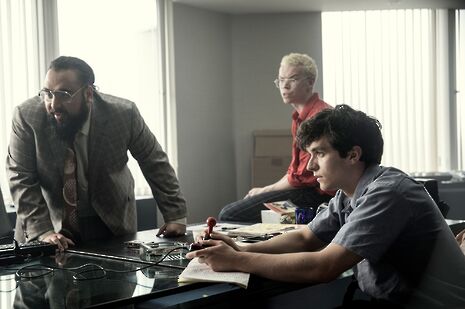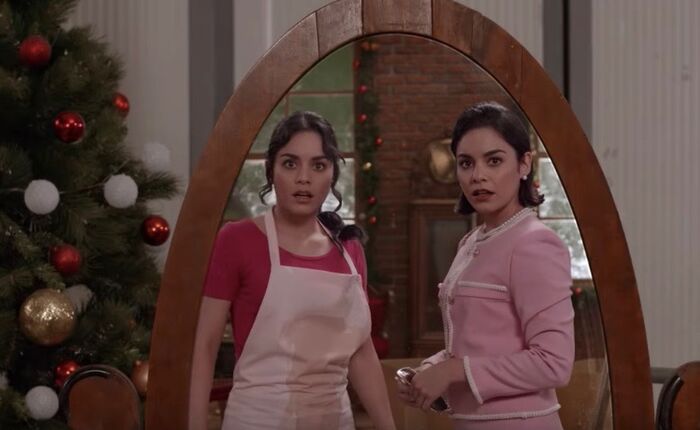No need to shun Black Mirror: Bandersnatch
With the release of this feature-length interactive special, Joy Hunter navigates the twisted world of Charlie Brooker

Directed by David Slade
Starring Will Poulter, Fionn Whitehead, Alice Lowe
Released 28 December on Netflix
This Christmas, Netflix subscribers were gifted the much-anticipated new instalment of Black Mirror in the form of Bandersnatch, a special named after a monster in Lewis Carroll’s ‘Jabberwocky’. And through the looking glass we go, climbing through mirrors into childhood flashbacks in this genre-defying showcase of television’s potential as an interactive medium, pulling festive family arguments over which channel to watch into the actual episode. Perhaps it is best not watch this with your relatives round the sofa if you want to make it out alive.
Along every thread and rabbit hole of this looping network of a story, series creator Charlie Brooker forces us out of the normal bedridden comas from which we usually watch Netflix shows. He has prodded and poked us to the edge of our seat as we choose our own way through a twisted maze with several possible endings, some feeling like cop-outs, and others which are genuinely mind-bending.
At its most playful, we enter an adventure video game ourselves, with Stefan (Fionn Whitehead) jumping into an action-packed fight sequence with his therapist. As Stefan becomes aware that someone is controlling him, we find something psychotically delicious in being able to explain the format of the film to the character who is helplessly trapped within it. At its darkest, Bandersnatch feels like a convincing experience of being inside a mind that is slowly descending into madness. Some of the choices we are forced to make, between letting Stefan or Colin (Will Poulter) throw themselves off a high-rise balcony, or chopping up the body of Stefan’s dad (Craig Parkinson), are genuinely disturbing, certain to haunt the viewer with the unsettling power that has come to characterise the series.
This mammoth of a concept meant there was little energy left in the writer’s room for character development, and it shows. However, given how complex this show would have been to build, its admirable the cast and crew were able to pull it off at all. Though lacking in dimension, the characters are helped along by a skilful use of comedy and a stellar cast, as well as the perfectly pitched level of ‘80s nostalgia.
Far less forgivable is how the story leans into the damaging trope that ‘mental illness equals creative genius’. Choose the path where Stefan takes his medication and the show leads you to an abrupt ending, with his video game receiving mediocre reviews. The show then prompts you to throw Stefan’s medication away, which leads you to the far meatier endings, with the game receiving five stars when Stefan is at his most mentally unhinged. There’s nothing groundbreaking about the stereotype of the crazy artist, or the notion that accepting treatment for mental health somehow stifles creativity. It was disappointing to see such a backwards message within a show acclaimed for its forward-thinking ideas.
That being said, a choose-your-own-adventure episode about a choose-your-own-adventure game is still an irresistibly genius concept from writer Brooker and director David Slade. It simultaneously allows the episode to play with being both tongue-in-cheek and incredibly dark. Most eyeball-melting (literally) are discussions of the limits of free will, or the different pathways merging into each other, with Colin disappearing despite us going back on our choice to kill him, or Stefan remembering conversations from different timelines. Sharp meta-awareness makes this show, and yet, though highly entertaining in this one-off special, this artistic choice does demonstrate the potential limitations of the interactive format. The decision go meta is ultimately something of a novelty that begs the question: if the story had nothing to do with the format, would we really be as engaged? The relative lack of success of other interactive specials, such as HBO’s Mosaic, suggest we would not.
And yet, Bandersnatch still deserves to be commended for daring to jump into this new format and executing it with real style. This is a fearlessly bold and original episode, reinstating the quality Black Mirror was beginning to lose in recent series until now. TV nerds like myself will relish the chance to revisit this episode and venture down its many interweaving paths. But has it hailed in a new day for the future of TV? Time will tell, although time of course is an illusion. While I’m not entirely convinced of interactive television’s potential beyond this show, Bandersnatch itself has been a truly thrilling and provocative ride, and the ideal journey to split open this fascinating question. Ultimately then, it must be four stars from me, but I suggest you choose your own path
 News / Judge Business School advisor resigns over Epstein and Andrew links18 February 2026
News / Judge Business School advisor resigns over Epstein and Andrew links18 February 2026 News / Gov grants £36m to Cambridge supercomputer17 February 2026
News / Gov grants £36m to Cambridge supercomputer17 February 2026 News / Hundreds of Cambridge academics demand vote on fate of vet course20 February 2026
News / Hundreds of Cambridge academics demand vote on fate of vet course20 February 2026 News / CUCA members attend Reform rally in London20 February 2026
News / CUCA members attend Reform rally in London20 February 2026 News / Union speakers condemn ‘hateful’ Katie Hopkins speech14 February 2026
News / Union speakers condemn ‘hateful’ Katie Hopkins speech14 February 2026










